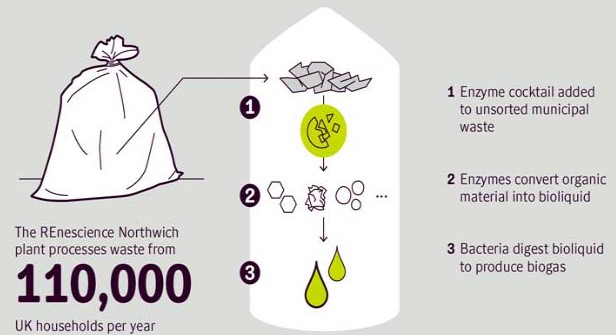Novozymes will deliver enzymes for DONG Energy's REnescience plant in Northwich
Last February, DONG Energy announced its decision to
build a first-of-a-kind plant for handling unsorted household waste by means of
enzymes. This commercial full-scale facility is being built in Northwich (North
West of England) and will have an annual capacity of 120,000 tons of waste. It
is expected to be fully operational by early 2017 and the waste will be
supplied by the waste management company FCC Environment, which already
collects household waste in the region.
Figure 1. 3D Model of the REnescience
plant in Northwich (extracted from REnescience web page)
Now, DONG Energy and Novozymes have
just agreed that the latter will deliver enzymes for the coming plant. The process
is based on the REnescience technology
that has been developed by DONG Energy and tested at a pilot plant located at
the Amager Ressource Center in Copenhagen (Denmark) since 2009. In this
process, unsorted MSW is wetted and warmed to temperatures appropriate for
enzymatic hydrolysis. Through enzymatic action, biodegradable materials are
liquefied to generate a pumpable bioliquid, which permits easy separation of
non-degradable solids. This bioliquid is suitable as feedstock for biogas and
the production of other chemicals such as lactic acid and butanol.
Figure 2. Role of enzymes in
converting unsorted household waste into biogas (extracted from the press release of Novozymes)
At the Northwich facility, the bioliquid
will be used to produce biogas that will generate around 5 MW of electricity. The
remaining part of the waste will be divided into two fractions. The
3-dimensional fraction, mainly containing high value plastics and metals, suitable
for further sorting and recycling. And, the 2-dimensional fraction, mainly
containing textiles and plastic foils, suitable for further sorting and
recycling or for producing fuels (Refuse Derived Fuel and Solid Recovered Fuel).






